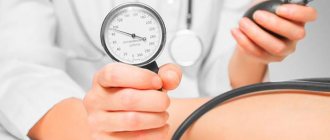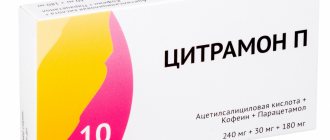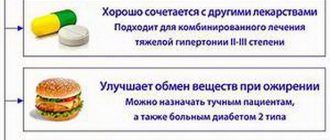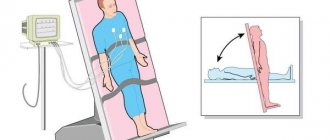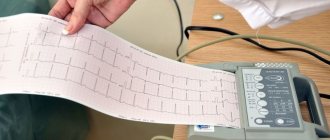Tachycardia, which is characterized by increased heart rate, often has nothing to do with blood pressure readings. A high pulse with normal pressure, if it persists for a long time or occurs with a certain frequency, indicates the development of serious pathologies. To establish the cause and make an accurate diagnosis, you should undergo a full examination.
Physiological reasons
An elevated heart rate can occur for various physiological reasons. In this case, there are no serious threats to human health. Most often, an increase in indicators is noted during intense physical activity that does not correspond to the age and capabilities of a particular person. For example, the heart rate increases in people without adequate physical training after climbing stairs or lifting a heavy load.
Mental stress also causes a high heart rate. This condition is often noted by students when preparing for serious exams or by employees of enterprises before signing important documents. The cause of an increased heart rate against the background of normal blood pressure can be any stressful situations and an unstable emotional situation. In such cases, the occurrence of internal anxiety, sleep disturbances, and in severe cases, panic attacks occur.
Other common physiological causes:
- Climatic conditions. In particular, heat is often a provoking factor. Against this background, the concentration of oxygen in the blood decreases, so the heart begins to pump hematological fluid through the vessels faster in order to prevent hypoxia.
- Drinking large quantities of drinks that have tonic properties. First of all, these include tea and coffee.
- Smoking, drinking alcohol and using drugs. Against the background of addictions, vasoconstriction and impaired blood flow occur. This increases the load on the cardiovascular system.
Can blood pressure cause pain in the cardiac region?
The answer to this question is clearly positive, because blood pressure affects the volume of cardiac output, blood circulation and the tone of the vascular walls. Cardiac output is the amount of blood that the heart throws out during one contraction.
Blood pressure measurement
When blood pressure decreases, the patient may experience:
- severe and severe weakness;
- fatigue;
- noise in ears;
- shortness of breath;
- headache;
- pain in the heart, similar to a sharp compression of the organ or squeezing in the left region of the sternum.
With increased pressure, the pain may radiate to the left side. There is a feeling that the pain covers the entire chest.
Pain behind the sternum and in the cardiac region is not characterized by spreading to the left arm, shoulder or scapula. Taking nitroglycerin for hypotonic pain does not improve the condition and can increase the intensity of pain in the heart and head. In this condition, there is no guarantee that a person will not become a victim of an attack of angina or myocardial infarction. It is especially worth paying attention to the nature of the pain. It can be stinging. In this condition, you must immediately call an ambulance and take a nitroglycerin tablet under the tongue.
Pathological causes
A rapid pulse can be observed against the background of normal blood pressure with congenital and acquired heart defects. These pathological conditions are characterized by a variety of manifestations and have varying degrees of danger. In most cases, the problem can only be eliminated surgically.
Another common cause of rapid pulse associated with the development of cardiac pathologies are inflammatory diseases that affect the structure of the heart muscle. These are myocarditis, endocarditis, rheumatism, etc. Without appropriate therapy, these diseases pose a threat to life.
Rapid pulse also occurs for the following pathological non-cardiac reasons:
- Dehydration. When the body loses a lot of fluid, the blood thickens. This increases the load on the heart muscle, which causes it to contract more intensely.
- Infectious diseases. When the temperature rises, the body becomes intoxicated. In order to quickly remove harmful substances from the body and normalize the condition, the heart begins to pump blood faster.
- Neurotic diseases. The level of stress increases in such cases due to the release of large amounts of stress hormones.
- Hormonal disorders. As a rule, they are associated with dysfunction of the thyroid gland and adrenal glands. An increased amount of hormones leads to intoxication of the body. Against this background, the heart muscle begins to work more intensely.
- The occurrence of severe bleeding. This is due to a violation of the volume of blood circulating in the body. To provide tissues with the necessary amount of nutrients and oxygen, it is necessary to accelerate the pumping of hematological fluid through the vessels.
- Anemia. Most often, increased heart rate is observed with iron deficiency anemia. Additionally, increased fatigue with minimal physical activity and deterioration of the condition of the skin and nails are noted.
Heart pain due to arterial hypertension
Heart pain is not a direct cause of high blood pressure. Although a hypertensive crisis may be accompanied by pain in the chest, they are observed in only one patient out of four.
But chronically high blood pressure leads to other heart diseases. They are the ones who cause pain. Most often, arterial hypertension is combined with coronary heart disease. High blood pressure is detected in 80% of patients with coronary artery disease.
In Russia, as in other European countries, there is insufficient control of arterial hypertension. Only half of patients receive adequate antihypertensive therapy. The rest receive only occasional treatment or no treatment at all. This leads to damage to target organs, one of which is the heart.
Pain characteristic of angina pectoris occurs. They intensify or appear during physical activity or stress, weaken or disappear in a state of physical and emotional rest.
Danger
Tachycardia is a dangerous condition. Great threats to health, and sometimes to life, arise when an elevated heart rate (more than 100 beats per minute) persists for a long time. In this case, the likelihood of cardiac arrest increases. Therefore, it is important to know why a high pulse occurs at normal pressure and what to do to stabilize the condition.
With tachycardia, there are risks of impaired metabolic processes, which can provoke the development of immunodeficiency and cause other negative consequences. Very often, fainting occurs regularly against the background of tachycardia. This may cause injury. Also, the pathological condition can provoke a heart attack and increases the risk of thromboembolism.
My heart hurts! What to do?
One of the most common reasons for visiting a doctor, especially a cardiologist, is cardialgia, i.e. pain in the heart area. However, this does not always indicate a pathology of our vital organ. First of all, cardialgia may be associated with dysfunction of the nervous system, especially at a young age. In adulthood and old age, the cause of cardialgia can be hormonal imbalance: menopause (especially premature) and the menopausal period.
Very often, cardialgia and thoracalgia (chest pain) are a consequence of osteochondrosis or other pathology of the spine, pathology of the costothoracic joints (Tietze's disease or syndrome) or the so-called intercostal neuralgia (Bronholm's disease).
Pathology of the pleura or lungs (usually inflammatory, less often the result of a neoplasm) is also, as a rule, accompanied by thoracalgia.
In diseases of the esophagus, stomach, and transverse colon, the leading complaint is often discomfort “in the area of the heart.”
If all of the above reasons are absent, most likely thoracalgia is associated with pathology of the cardiovascular system. Moreover, this does not always manifest itself as coronary heart disease (CHD), i.e. angina pectoris (angina pectoris). With sudden increases in blood pressure (crises), cardialgia occurs very often even without the presence of clinically significant ischemic heart disease (so-called hemodynamic angina).
Cardialgia is a leading symptom in inflammatory lesions of the heart muscle (myocarditis) and its outer membrane (pericarditis), and in anemia of various origins (most often iron deficiency). Cardialgia can occur with cardiomyopathies - a kind of degenerative changes in the heart muscle and/or its inner lining (endocardium), tumors of the myocardium or pericardium (both metastatic (more often!) and primary).
Here is a far from complete list of diseases that cause pain in the chest area (only the main, most common ones). But even from this minority of etiological factors (causes) of cardialgia, it is obvious that clarifying the cause-and-effect deviations of this symptom is an insoluble task for the patient and a very difficult task for the doctor. Every patient has the power to facilitate and speed up the diagnostic search for the doctor and help him avoid possible mistakes.
First of all, the patient is required to clarify the location of the pain, its nature (pressing, stabbing, feeling of “heaviness”, etc.), duration (seconds, minutes, hours, days, constant); provoking moments (physical activity (what kind), walking (the distance covered before pain appears on level ground, or climbing a certain number of flights of stairs, cold headwind), stressful situations, etc.). It is very important what medications relieve or relieve pain: nitrates (nitroglycerin tablets or its sprays) or sedatives, i.e. sedatives, which include validol, corvalol and their analogues.
Before visiting a doctor, it is advisable to monitor blood pressure (at least 3-5 times during the day), pulse, paying attention not only to its frequency, but also to its rhythm.
All this does not apply to retrosternal pressing pain that is not relieved by nitrates for more than 10-15 minutes. In this situation, you should call an ambulance team as soon as possible, which has been working for 6 years according to the most modern principles of providing care for suspected myocardial infarction.
In other cases, you should contact a cardiologist (general practitioner if there is no cardiologist on site) of the clinic.
An experienced cardiologist of the highest qualification category works in the Orenburg branch of MMC Medical On Group - Orenburg LLC; it is possible to record and analyze an electrocardiogram, including with physical activity; a complete clinical, biochemical and immunological examination, which ensures rapid diagnosis and prescription of optimal treatment.
Patients are accepted from any city and district of the region, nearby regions, republics, states (Bashkiria, Tatarstan, Kazakhstan).
Diagnosis and treatment
Since a rapid pulse can have different causes, in order to carry out the correct treatment of tachycardia at normal pressure it is necessary to undergo diagnostics. To do this, you should visit a cardiologist.
First, the doctor talks with the patient to collect anamnesis. Blood pressure must be measured during the examination to confirm compliance with standard indicators. After this, electrocardiography is prescribed. This study is considered the most informative when it is necessary to determine the causes of tachycardia. Additionally, if necessary, other specialized studies may be prescribed according to existing indications.
Now in practice, various methods are used to treat tachycardia at home in accordance with the diagnosis. Therapy is always prescribed by the doctor on an individual basis, taking into account the patient’s condition. The main goal is to eliminate the diagnosed pathological process in the body.
For symptomatic treatment to reduce the pulse, special medications are prescribed. They can now be bought in pharmacies at an affordable price. In severe cases, surgical treatment is indicated.
Why does my heart hurt with normal or low blood pressure?
Heart pain occurs in patients with normal or low blood pressure for the simple reason that hypertension is neither the only nor even the main cause of chest pain. Any person can have heart pain, as there are a huge number of causes for this symptom.
We have already said that the chest contains not only the heart. Accordingly, at a doctor’s appointment it often turns out that another organ (stomach, esophagus, spine, etc.) is hurting. But if it is determined that it is the heart, then in 80% of cases the cause is coronary syndrome. Other diseases are less common: these may be myocarditis, cardiomyopathy, heart defects (usually mitral valve prolapse), aortic stenosis, pulmonary hypertension.
Treatment
Without organic and functional disorders, the heart can hurt for various reasons, but treatment remains complex. Cardiologists recommend:
- regulate your daily routine and sleep (sleep at least 8 hours);
- walk more often in the fresh air;
- engage in physical therapy (if there are no contraindications);
- normalize nutrition (increase the amount of fruits, dried fruits, dairy products);
- reduce the likelihood of stress;
- take vitamin complexes.
Depending on the symptoms, the doctor may prescribe sedatives that have a sedative and relaxing effect.
